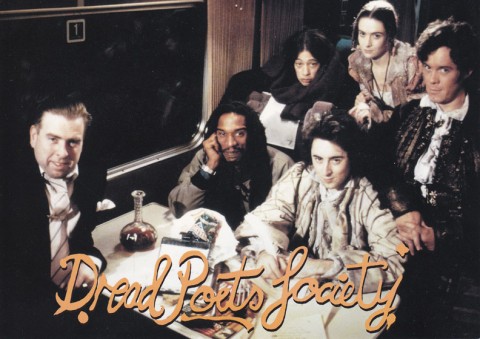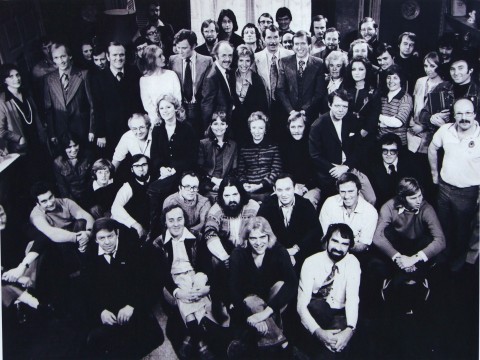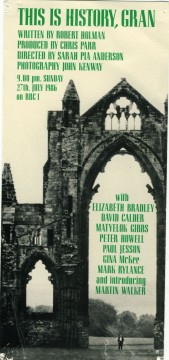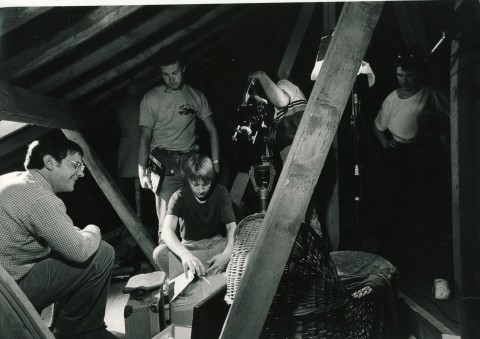
Sue Watson
A Hard Lesson Live on Air
Pebble Mill was always there. I’m not sure I knew exactly what or where it was – it had always been in my consciousness. Alan Titchmarsh had often entertained me on days off sick from school – well there was nothing else on. The man was as comfortable with international film stars as he was with spring bulbs and compost and I could only watch in awe as he spread his Northern charm like gravy on Yorkshires. So when, at the age of 33, fresh from working on The Sun newspaper, I entered the hallowed portals of the BBC – I knew this was somewhere special where big things happened.
After meeting with several members of the Good Morning team followed by an informal interview, I was taken to the Crush Bar where machine Cappuccinos were the order of the day. Here, sipping from a polystyrene cup and gazing out onto Pebble Mill Road, I was told I had the job of News Researcher and my TV life was born.
Elated and terrified, I swallowed hard… I was a print journalist, what the hell did a TV news researcher do anyway? I’d just got myself a brilliant job on a BBC programme at the famous Pebble Mill – and I hadn’t a clue what it involved.
The following few weeks were a fog of programme briefs, phone calls, acres of newsprint, gallons of ‘polystyrened’ coffee and a great deal of hand holding from my colleagues. It was pre-internet, pre mobile phone and all I had to rely on in this strange new world were Cadburys Double Deckers and my trusty Guardian Media Guide.
However, one day I was summoned to the Series Producers’ office: “You need to get a pool car and head for Cornwall,” the SP announced, “you’re going to interview Colin Wilson. It’s a live so you’ll need to talk him through it then stay with him when it goes out. A cameraman will meet you at Colin’s place… first thing tomorrow. OK?”
My response was to nod blithely. What? I needed to do this – I couldn’t let anyone know that I hadn’t a clue what she was talking about … Colin who? Where in Cornwall? Why me?
But the instruction causing most consternation was, ‘get a pool car.’ There was nothing in my well-thumbed Media Guardian Guide about such things as a ‘pool car’ (yes, sadly, I confess, so reliant was I on this organ I did check). I rushed back to my desk and looked long and hard under C in the index but there was no mention of cars, Colin or Cornwall. I was lost.
Bemused, I looked up from my desk to see a friendly face and hear someone tell me they’d booked a car, a hotel room and here was a printed sheet with Colin’s address, a map and what looked like the phone numbers of everyone in the BBC! I felt a warm rush of relief flood through me – so this was what it was like to work in telly? Television was turning out to be a completely different animal from the cut-throat world of tabloid journalism where everyone was testing you and treading on each other to get to the top story.
And so it was on a warm August day I left Pebble Mill for ‘Colin’s in Cornwall.’ Driving through the back car park in the warm sunshine, I felt safe in the knowledge that I had a full tank of petrol several maps, my body weight in chocolate and a BBC phone number for every eventuality in every location across the globe. My colleagues, now friends, came to see me off encouraging and waving me on like I was going to war. Looking back I think perhaps they’d met Colin Wilson and knew my fate. All I can say is that they filled me with confidence, these pretty young girls smiling and waving in the sunshine reminiscent of a scene from Stepford Wives… in a good way.
The following day I waited in Colin Wilson’s cosy but chaotic home, feeling anxious that the famous Criminologist (I’d asked a colleague – again the Guide had let me down) had not yet made an entrance. Eventually he appeared, with ten minutes to go, his hair askew and no Pebble-Mill-Stepford smile in evidence.
“Would you like to rehearse what you are going to say to Anne Diamond,” I asked nervously, smiling and hoping for one in return. Without responding or acknowledging me he flopped in his armchair.
“It’s … live,” I offered, wondering if he’d heard me.
“No,” he barked, “I don’t need to rehearse… I’ve done these hundreds of times.” I was worried, my producer wanted information about this ‘chat’ and I needed to fax programme briefs back to Pebble Mill, but Colin wasn’t playing ball.
We sat in silence until, within seconds of going live on air, Colin suddenly announced ‘I’ve got the trots.’ He stood up saying; I’m going to the toilet.”
“No… you can’t,” I said and just when I thought I might cry, he sensed my distress and agreed to wait until after the item.
“I can’t promise anything though,” he said gruffly, “keep the shot very tight and above the waist dear… just in case.” I looked at the cameraman who shrugged and nodded, who knew what would happen live on air?
Needless to say the following six minutes were the longest of my life and no-one was more relieved than me when Anne Diamond said ‘thank you,’ and the mic was turned off. This was the first of many ‘moments’ in telly – but it was at this point I cast off my water wings and learned to swim. I realised if I wanted to work in ‘live telly’ at pebble Mill, I needed to throw away my reference book and use my initiative instead.
After all, there was nothing in my Guardian Media Guide under ‘T’ for ‘trots,’ – and yes, I did check.
Sue Watson





